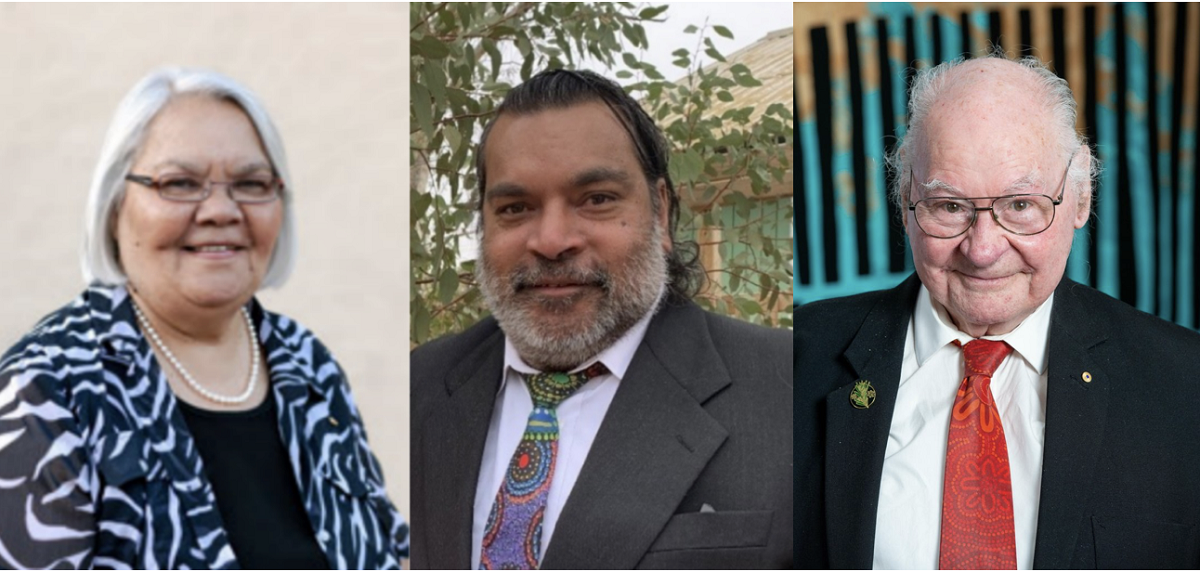
Kinship is embedded in Aboriginal and Torres Strait Islander cultures, defining relationships which ground Indigenous Australians to understand their individual connections and responsibilities to country.
Broadening public awareness of these concepts was one of many opportunities towards Reconciliation discussed at an intimate event last week, Padninthiyangga Ngadluku Purkgku – ‘Walking with Our Elders’, that featured Flinders University’s three Senior Elders on Campus.
In describing the significance of kinship, Uncle Richard ‘Balang/Japaljarri’ Fejo – a Larrakia man and Senior Elder at Darwin campus – explained: “Our kinship gives us an instant bond. For example, I can walk out into a community of people I don’t know and introduce myself through my skin name and be welcomed with immediate understanding of who I am.”
This same warmth was echoed throughout the Elders discussion, as Uncle Richard, Dr Auntie Pat Miller AO and Uncle Lewis Yarluburka O’Brien radiated the empathy and wisdom they are renowned for – sharing not only their thoughts on Reconciliation, but opening up with rich insights into their own backgrounds and cultures.
Growing up in Alice Springs, Arrernte woman Auntie Pat (Senior Elder at Alice Springs campus) recalled children were caned at school if they spoke their traditional language, and all Aboriginal were people confined to their homes after 6pm.
“We were always afraid of the police and the welfare people,” she said.
“As children, we’d hide behind trees if we saw them coming – there was always something you could be reported for.”
This adverse environment was mitigated in part by the support of large, close-knit communities and families.
Together with her own Arrernte group, Auntie Pat said she mixed with people from a further 14 or 15 central Australian Aboriginal language groups who regularly came together in the town. This fostered excellent listening skills and the ability to interact well with individuals from different backgrounds.
Not only has this respect and understanding shaped her own journey, Auntie Pat says it is the key to Reconciliation.
Kaurna Elder Uncle Lewis (Senior Elder at Bedford Park campus) spoke of the importance of thinking twice, or Muka Muka, which translates literally to two ovals, or hemispheres of the brain, and describes a strategic way of recognising an action and its effect.
He said this concept is shared across Aboriginal and Torres Strait Islander cultures and used Kaurna examples to illustrate how it embeds foresight into every decision and has ensured sustainability of the land for more than 60,000 years of Aboriginal custodianship.
He described how the twin peaks of Mount Lofty and Mount Bonython are Yurabilla, the two ears of the giant Ngannu (kangaroo) that lies there, and a reminder to think twice at all times.
Associated with this is the word Ninthi, meaning transformation, or changing state.
“Again this involves thinking about two things – what is it doing now, and what is it becoming?” He said.
“For example, we can’t stop bushfires but we can burn off undergrowth so they are not as bad; Our people would take two eggs and leave two in the nest so populations could increase. We had to think ahead, sustainability was practiced every day, all day.”
Together with shared concepts, Uncle Lewis explored different strengths across groups. “Cultural groups specialised in different areas. So, we learned from each other – just as countries have always learned from other cultures around the world with all their different specialities.”
Uncle Richard’s people, the Larrakia, are known as salt-water people but their country also extends inland. He described how it includes Gurambai (Rapid Creek), a freshwater spring that opens to the sea and mixes to a swirl of sandy mud where it meets the incoming tide.
“This is how we see our history,” Uncle Richard explained. “Aboriginal and non-Aboriginal people have come together and thrown up a lot of muddy water.
“We are all moulded by our family and teachers, and we need to recognise that there is an adjustment period when we meet others. There are gaps in our knowledge and understanding of each other, and gaps within these gaps. We need to observe and sense where these are, as our aunties and uncles taught us.”
Uncle Richard also highlighted the importance of being optimistic and focused on a positive journey.
“There is an old saying that happiness is not a destination but a way of life. Reconciliation is the same, we need to think about reconciliation in the same way.” Reconciliation needs to become our way.
Padninthiyangga Ngadluku Purkgku – ‘Walking with Our Elders’ was presented by Flinders University’s Office of Indigenous Strategy and Engagement and Poche Centre for Indigenous Health, as part of the University’s Innovate Reconciliation Action Plan.
It was facilitated by Associate Professor Simone Ulalka Tur, Pro Vice Chancellor (Indigenous) and Dr Maree Meredith, Deputy Director for the Poche Centre for Indigenous Health.
The event recording is now available online – view here.


